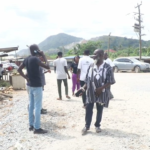Scholars over the weekend concluded a workshop aimed at scrutinizing the role of coercion in peacebuilding.
The three-day author’s workshop, hosted by Kofi Annan International Peacekeeping Training Centre (KAIPTC) in collaboration with the Peace Research Institute Frankfurt (PRIF) and Institute for Peace and Security Studies (IPSS) provided a platform for scholarly discourse on the intricate interplay between coercion and peacebuilding as well as ECOWAS’s coercive approaches in sub-regional interventions.
Speaking to the media on the sidelines of the opening of the workshop, PRIF Director, Dr. Antonia Witt says the emergence of new actors in buildings has heightened the need for an assessment of what the best approach of peacekeeping is.
“We study the role of coercion and peacebuilding and specifically the role for new and emerging actors, for instance Brazil, India and China who have become increasingly important peacebuilders on the continent, and it raises the question of how to do peacebuilding best,” she told Journalists.

“In previous times there was the assumption that peacebuilding goes without coercion but we increasingly see that maybe that assumption is wrong. We see that the difference between peacebuilding and peacekeeping increasingly blur”, she added
Dr. Witt however emphasized the need to find a balance in the use of coercion so as not to escalate violence.
“But we also realize that maybe a certain level of coercion is necessary so that the peace that is built holds. And that brings the question, how much coercion is necessary or is there a flip side where coercion turns into something that produces more conflict?”, she concluded.
On his part, Deputy Commandant, KAIPTC, Air. Cdre David Anetey Akrong urged the scholars to at the end of deliberation proffer relevant policy suggestions that enrich the landscape of peacebuilding.
Source: Ghana/Starrfm.com.gh/103.5FM/Edem Kojo




